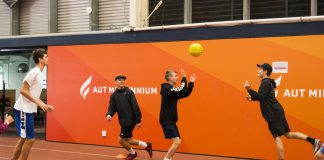In last week’s blog I left you with an important question to consider: whose responsibility is it to drive training motivation in youth athletes?
As a kid you typically get your first exposure to sport in the back yard, whether it involves throwing a ball around with Dad, or a game of backyard cricket with your siblings, this is typically where it starts.
So, why do we do it?
Well, we’re motivated for two main reasons. First, it feels good to develop and demonstrate competence. In other words, we like getting better at things. Secondly, it feels good developing competence within an important group because it gives us a sense of belonging.
As time goes by the motivation to continue comes from within. You keep playing because it feels goods to take five catches when yesterday you only managed four.
It feels good when you hit your first six over the back neighbour’s fence and it feels good when you bowl your older brother out for the first time (even if he did purposely ‘play all around it’ and miss). Ultimately, the goal of a young person is to ‘master’ their environment.
Once you reach school age the opportunity to enrol in your first sports team comes next. How exciting! There’s no better way to test the skills you’ve been working on in the backyard and now you get to do it with your mates.
However, it’s at this point where things can very easily go wrong and motivational issues begin to arise.
It’s now the coach’s job to create a learning environment which nurtures the intrinsic motivation that the young athlete developed in their backyard.
A ‘Mastery Involved’ Learning Environment
Take a moment to answer the following questions:
- What drives you to do the things you do?
- When do you enthusiastically give your best towards achieving a particular goal or achievement?
- When are you much more likely to cooperate to enhance mutual goals and directions?
Now, you’re probably thinking of many things, however, when you consider what motivates you the most, it’ll likely come down to these 3 things:
You get to choose what it is. Or at the least, you’re provided with some autonomy over decision-making
You’re developing competence, or feel capable of achieving success.
You feel like your contribution to the team is valued giving you a sense of belonging.
Provide Some Choice
Intrinsic motivation is closely aligned with the capacity of an individual to act independently. Therefore, it’s important to give your athletes an opportunity to make their own free choices.
For younger athletes (6-11 year olds) this could be achieved by providing less structure at practice, giving them the chance to be more creative in the things they are doing, or by giving them input into team decisions (e.g. rules or strategy).
For adolescents, give them the chance to contribute to the training plan or provide options to choose from during a session. Encourage athlete to take ownership over their development.
Develop Competence
Participation in sport provides young people with a wonderful forum in which to test and develop their skills, to learn how to overcome setbacks and to gain immediate feedback concerning their progress toward achieving identified outcomes.
However, as it turns out, athletes are not the same, which is an incredibly important detail when it comes to intrinsic motivation.
Accordingly, catering for an athlete’s specific needs and giving them the chance to develop competence in the things they want to get better at is crucial.
When you set training tasks it’s important that they are developmentally appropriate, and you have explained their purpose and value.
Create A Sense Of Belonging
Sports provide individuals with a place where they can develop their skills and gain a sense of achievement. Additionally, they also provide them with a status that satisfies their need to have a defined place within a group that is highly valued by their peers.
It’s important that the opportunity to hang out and socialise with friends is present in all sporting environments, regardless of the level they are competing at.
Reward The Controllers
How you recognise success is crucial.
Focus on rewarding effort and persistence, not winning or out-performing others. This teaches athletes that success comes from hard work and sustained effort and is personally determined, rather than resulting from natural ability than you either have or you don’t.
Lastly, use private recognition for individual accomplishment, rather than making social comparisons. You words are much more powerful than material rewards.
Part 3. How to develop a mastery-involved learning climate with goal setting
Watch this space for next week’s article.





































